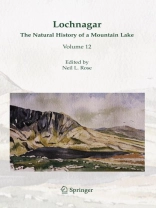Previous volumes in this ‘Developments in Paleoenvironmental Research’ (DPER) series have focussed on providing in-depth descriptions of palaeoenvironmental techniques or have described the applications of these approaches on various regional bases. The former of these now provide an invaluable series of standard text books for scientists and students, while the latter show how the application of palaeo-techniques can be used across broad geographical scales. In this current volume, we have attempted something a little different. Not only are a variety of palaeo-techniques applied to a single, small lake, but we have tried to show how these methods, and the data derived from them, can be integrated synergistically with contemporary monitoring and predictive modelling. The acidification and metals research provide two good examples of this. Along with other upland lakes across the UK, the early research work at Lochnagar was based on assessing the competing hypotheses for the causes of surface water acidification. As a result, palaeolimnological techniques were used to assess the timing and extent of p H changes over hundreds of years. The subsequent establishment of the UK Acid Waters Monitoring Network (UK AWMN) then allowed a range of biological and chemical parameters to be assessed routinely in order to determine the rate at which the lakes and streams, including Lochnagar, were recovering following emissions reductions.
Daftar Isi
The Environmental Landscape of Lochnagar.- Geology of Lochnagar and Surrounding Region.- The Shaping of Lochnagar: Pre-Glacial, Glacial and Post-Glacial Processes.- Lochnagar Water-Temperatures, Climate and Weather.- The Development, Distribution and Properties of Soils in the Lochnagar Catchment and Their Influence on Soil Water Chemistry.- Flora and Vegetation of Lochnagar – Past, Present, and Future.- The Contemporary Physical and Biological Status of Lochnagar.- The Sediments Of Lochnagar: Distribution, Accumulation and Composition.- Hydrology and Hydrochemistry of Lochnagar.- The Aquatic Flora of Lochnagar.- Pattern And Process In The Lochnagar Food Web.- Brown Trout in Lochnagar: Population and Contamination by Metals and Organic Micropollutants.- Anthropogenic Impacts from Atmospheric Pollutant Deposition.- National, International and Global Sources of Contamination at Lochnagar.- Acidification of Lochnagar and Prospects for Recovery.- Trace Metals in the Catchment, Loch and Sediments of Lochnagar: Measurements and Modelling.- Persistent Organic Pollutants in the Sediments of Lochnagar.- Temporal and Spatial Patterns of Spheroidal Carbonaceous Particles (Scps) in Sediments, Soils and Deposition at Lochnagar.- Future impacts.- Future Climate Predictions for Lochnagar.- Past and Future Environmental Change at Lochnagar and the Impacts of a Changing Climate.- An introduction to Lochnagar.- An Introduction to Lochnagar.- Physical Characteristics of Lochnagar.
Tentang Penulis
Neil Rose’s first degree was in Chemistry with Geochemistry at University of Leicester (1981 – 1984). He then joined the British Antarctic Survey and spent 30 months in the Antarctic working on limnology of sub-Antarctic lakes and discovering the joys of lake sediment. Upon return to the UK, he joined the Palaeoecology Research Unit (later becoming the Environmental Change Research Centre – ECRC) at University College London as a Research Assistant. His Ph D was awarded in July 1991 entitled ‘Fly-ash particles in lake sediments: Extraction, characterisation and distribution’. Since then he has remained with the ECRC being appointed Principal Research Fellow in October 2001. His main research focus is in the use of lake sediments to determine spatial and temporal distributions of pollutants in remote lakes and this has led him to work in Svalbard, Greenland, Uganda, China, Alaska and many European mountain areas. Further research areas include the source apportionment of fly-ash particles and the use of SCP temporal profiles to provide lake sediment chronologies for the industrial period. His research at Lochnagar began in 1988 and shows no sign of stopping any time soon.











